Learn the pros and cons of fresh and frozen veggies with this science-based answer to the common question: are frozen vegetables healthy?
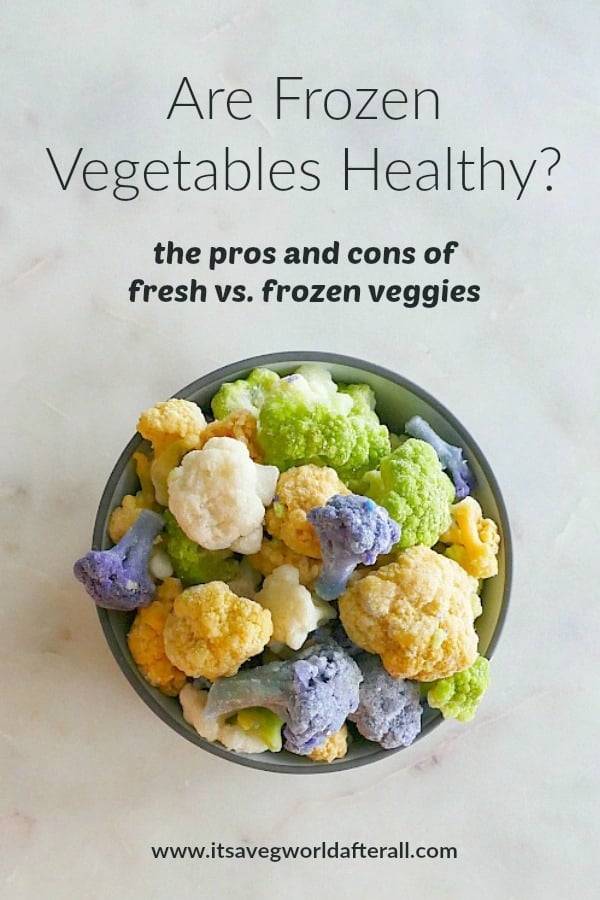
This post may contain affiliate links. For more information, see my affiliate disclosure.
Eating more vegetables is almost always a good thing. But you may be wondering about the differences between fresh and frozen vegetables. Is one healthier than the other? Do they taste different? What about cost?
Fresh and frozen vegetables both have pros and cons. What type of veggies works best for you depends on your lifestyle, budget, the time period in which you want to eat them, taste preferences, and more.
Read on to learn about the nutrition of fresh vs. frozen veggies and how to decide what kind of veggies fits your needs.
Are Frozen Vegetables as Nutritious as Fresh Vegetables?
People often perceive frozen veggies as less healthy than their fresh counterparts. However, most research indicates that frozen vegetables are just as nutritious, if not more nutritious, than fresh veggies.
Frozen veggies are picked as soon as they are ripe, washed, blanched in boiling water, and then blasted with cold air. This blanching and freezing process helps preserve texture and nutrients. As a result, frozen veggies typically do not need preservatives.
On the other hand, fresh vegetables are picked (sometimes before they are ripe), stored at a cool temperature, and then transported to be sold. In most cases, it can take a while for vegetables to get from the farm to your kitchen.
Freshly picked vegetables typically have the highest amounts of vitamins and minerals out of all types of veggies. However, research shows that fresh veggies begin to lose nutrients after they are picked, especially if they are refrigerated. This is true even over a short period of time, such as five days (1).
One study found that the vitamin C content of frozen peas, broccoli, green beans, carrots, and spinach was equal to or greater than the amount of vitamin C in their fresh counterparts (2). Other studies have shown that frozen veggies may also be higher in vitamin E, vitamin A, and folate compared to fresh produce (1, 3).
In summary, vegetables are likely highest in nutrients right after they are picked and before they are refrigerated. If these types of vegetables are unavailable, frozen veggies offer a convenient alternative with comparable nutrition.
Fresh vs. Frozen Veggies: Price, Shelf Life, and Taste
Fresh and frozen vegetables may have similar nutrition, but they differ in other areas. For instance, frozen vegetables tend to cost less and last longer than fresh produce.
Some people fear that frozen veggies may taste like their freezer. If frozen vegetables are appropriately stored, this should not be a concern. If you only use some of the frozen veggies in a bag, be sure to “double bag” the rest. You can use a plastic freezer bag or a reusable option, like the Stasher bag (affiliate link). This will help ensure that the veggies do not get freezer burn.
Below is a comparison of how long common fresh and frozen veggies last and how they differ in cost.
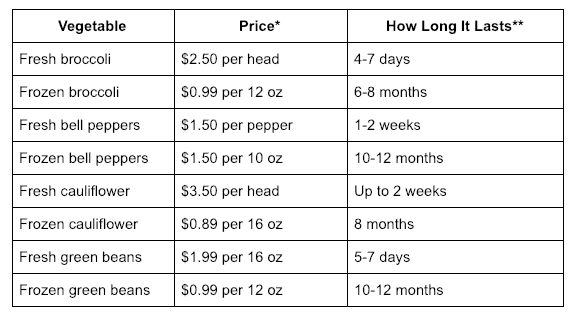
*Listed prices are based on the average costs at most large grocery stores. Prices may differ depending on your store and location.
**How long vegetables last may vary and depends on how they are stored.
What Kind of Veggies Best Fits Your Needs?
Now that you know the main differences between fresh and frozen vegetables, ask yourself what kind of veggies works best for you.
Do you live alone and/or cook for only one or two people? A mix of fresh and frozen veggies will help you avoid wasting produce that goes bad faster than you can eat it. Do you have a limited budget for groceries? Shop for fresh veggies that are on sale, and then supplement with frozen ones.
On the other hand, are you someone that shops at farmers markets or goes to the grocery store a few times a week? Then you probably prefer to choose fresh veggies most of the time.
No matter what works best for you, remember…the more veggies, the better!
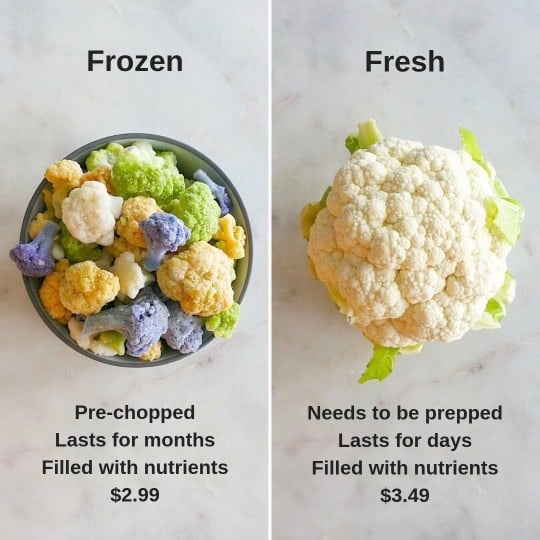
How to Incorporate Frozen Veggies Into Your Meals
You can cook frozen veggies many different ways. Most will come with instructions on how to prepare them.
To prepare frozen broccoli, for example, put florets in a small pot of boiling water and cook for 5 to 7 minutes. Drain in a colander, and season with your favorite spices before serving. You can also cook frozen veggies in a steamer over a pot of boiling water. Lastly, you can prepare frozen vegetables by microwaving them with ~¼ cup water in a microwave-safe bowl with a lid for 4 to 5 minutes.
Or, and this is my favorite technique, you can roast frozen veggies straight from the freezer. Check out my post on Roasted Frozen Brussels Sprouts or Roasted Frozen Broccoli for more info. Once cooked, frozen veggies can be added to pasta dishes (you can even cook them with your pasta like in my Lentil Pasta Primavera!), stir fries, eggs, pizzas, and more.
Overall, eating a variety of veggies, both fresh and frozen, will provide you with the nutrients you need!

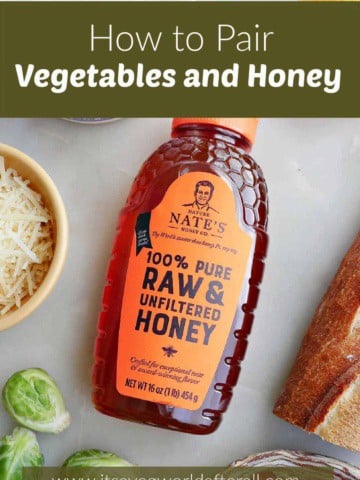
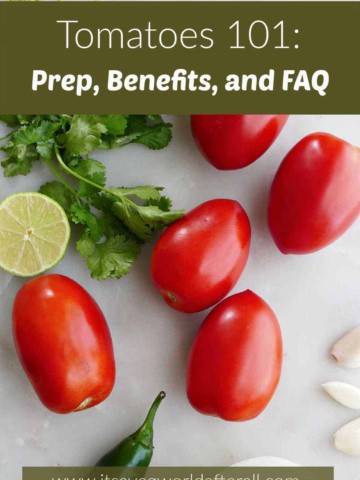
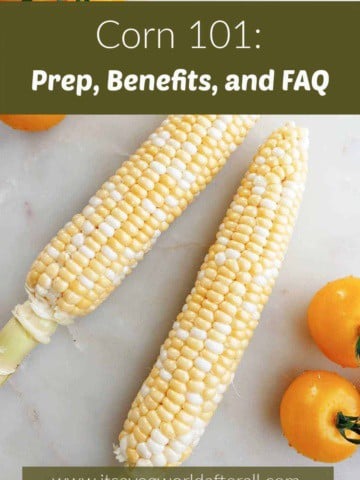
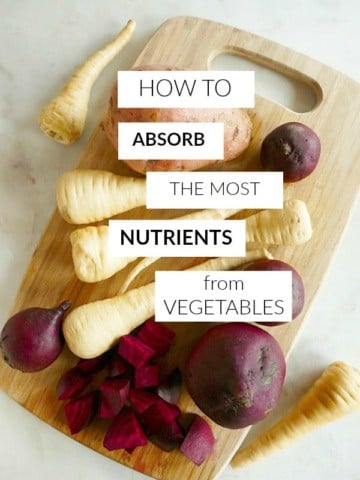
Mandy
Can the water from frozen veg be used for gravy?
Lizzie Streit, MS, RDN
I don’t see why not!